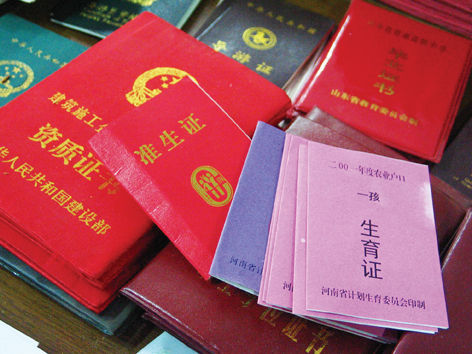
(Ecns.cn) -- Having a baby can be particularly complicated in China thanks to arcane regulations governing "official" permission to give birth, according to the Legal Weekly.
Li Mei, 36, has just had a baby in Beijing. She narrowly managed to obtain a birth permit only a few weeks before delivery, and describes her pregnancy as a "disaster."
Li says her husband Wang began applying for the permit when she was three months pregnant, but they had never imagined how complicated the procedure would be.
Because Wang's registered domicile is not in Beijing, the first challenge was to acquire reference letters from authorities in his hometown proving that it was his first marriage and that he had no other children.
Although Hebei Province is adjacent to Beijing, traveling back and forth between them to deal with the endless red tape nearly drove me mad, Wang says.
It's the kind of administrative nightmare that happens all too often in China. The committee responsible for Wang's registered permanent residence (hukou) deflected the request to his neighborhood committee in Beijing, citing a regulation that left too much room for misinterpretation.
After this tug-of-war went on for several months, Wang was still unable to get the essential letter from either of the two neighborhood committees, as both claimed the other party was responsible for it.
According to China's family planning policy, prospective parents must file for a birth permit before a pregnancy occurs. Without it, the consequences are very serious: parents will be forbidden from receiving a birth certificate for their child, which comes screaming into the world as a "non-person" as far the government is concerned.
Wang says he was tempted by stories of couples that had successfully forged birth permits, but he decided instead to solve the problem in another distinctly Chinese way: through connections and bribery.
Yet the letters are only a small part of the application for a birth permit. In the following months, Wang collected more than 40 stamped seals on different pieces of paper, an experience he says was "tortuous."
If both of us had permanent residences in Beijing, it would have been much easier, says Wang.
Many couples are confronted with the same problem in China, and if the female is a migrant worker things are even more difficult, because she will have to travel back and forth chasing paperwork with her enormous belly, he adds.
In recent years, more and more people have begun complaining about the permit, especially migrant workers in big cities.
An online survey conducted by Tencent.com shows that 99 percent of the 110,000 web users who participated believe the birth permit regulation is outdated and should be abolished immediately.
People often call the birth permit the "pain" permit, says Li Jianmin, professor at the Institute of Population and Development Research of Nankai University.
It was introduced in China about three decades ago and originally seen as a temporary "last resort" to control the population, but now it just causes trouble for the public, and some civil servants even abuse it to make money, explains Li.
Some worry that ending the regulation will result in more breaches of the one-child policy, but this is a "fake problem," adds Li. The fact is that those who insist on having more than one child will do so even if the regulation exists, he says.
In 2004, Guangdong Province took the lead in canceling the birth permit regulation for local residents. Since then, an expectant mother whose hukou is registered there need not apply for a birth permit before delivery, according to the Legal Weekly.
Experts say that there may be gradual changes to the one-child policy, but the birth permit regulation is not likely to be abolished in the rest of the country any time soon. As such, couples who plan to have children should inquire about birth permits as early as possible.

Copyright ©1999-2011 Chinanews.com. All rights reserved.
Reproduction in whole or in part without permission is prohibited.